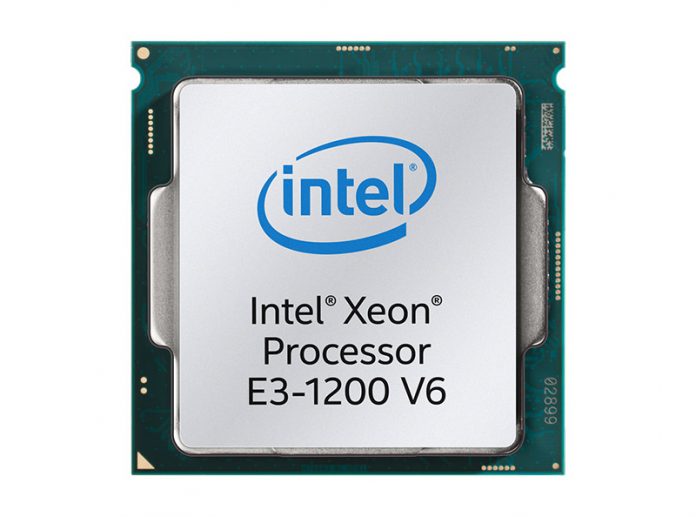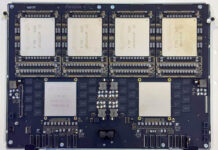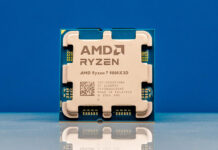In the Xeon E3-1200 ranges, Intel generally has one flagship model that carries the highest clock speed, but also the highest price tag, by a significant margin. The Intel Xeon E3-1280 V6 we are sharing Linux benchmarks for today is that flagship model in the Kaby Lake generation.
Understanding the Intel Xeon E3-1280 V6 Value Proposition
With 4 core, 8 threads, 8MB L3 cache, 3.9GHz base and 4.2GHz turbo clocks the E3-1280 V6 differs from the Intel Xeon E3-1270 V6 insofar as it has a 100MHz higher base clock. Another major difference is that the price is almost 2x, or a ~$300 premium for that 100MHz base clock boost all within the 72w TDP threshold.

We did an initial value analysis of the Intel Xeon E3-1200 V6 series and Intel certainly prices the E3-1280 V6 at a steep premium.
One other point we should make is that in terms of overall hardware costs, as the system price increases, it can be a low/ mid single digit percentage difference in price. On lower cost systems, the Intel Xeon E3-1280 V6 makes little sense.
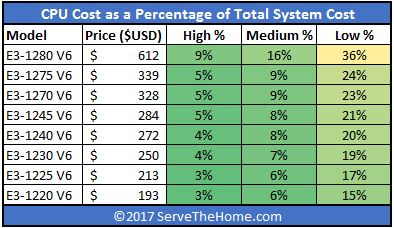
There are many applications (e.g. databases and professional engineering software) where software license costs dwarf hardware costs as well, and those are really the market for the Intel Xeon E3-1280 V6.
Test Configuration
For this setup, we used what we would expect to be a fairly typical server:
- CPU: Intel Xeon E3-1280 V6
- Motherboard: Supermicro X11SSH-F
- RAM: 2x 16GB ECC DDR4-2400 (Crucial)
- SSD: Intel DC S3710 400GB
- OS: Ubuntu 14.04.5 LTS (performance benchmarks), Ubuntu 16.04.2 LTS, VMware ESXi 6.5, Centos 7.3
We did want to take a moment and discuss some of the comparison data we are going to use. We do have the entire AMD Ryzen SKU stack to data along with the entire Xeon E3-1200 V6 range’s CPU core/ clock variants. We also have some legacy data points to give additional perspective.
The Ryzen comparison is tough. Although it supports ECC memory on the CPU, we still are not seeing enough software maturity to call it a stable server platform. Also, there are great workstation platforms but no real server platforms at the time of this writing. If you want a server, you want E3-1200 V6. If you are building a workstation with a NVIDIA or AMD GPU, Ryzen is certainly a competitor.
We have the Intel Core i7-7700 and i7-7700K chips in the comparison as well. Although many vendors will say workstations require ECC memory, there are plenty of customers who will trade ECC memory for 25% more performance.
Intel Xeon E3-1280 V6 Benchmarks
For our testing, we are using Linux-Bench scripts which help us see cross platform “least common denominator” results. We are using gcc due to its ubiquity as a default compiler. One can see details of each benchmark here. We are likely going to update the Linux-Bench shortly with a few new tests as well as an even simpler to use/ faster revision, but for now, we are using the legacy version that now has over 100,000 test runs under its belt.
Python Linux 4.4.2 Kernel Compile Benchmark
This is one of the most requested benchmarks for STH over the past few years. The task was simple, we have a standard configuration file, the Linux 4.4.2 kernel from kernel.org, and make with every thread in the system. We are expressing results in terms of compiles per hour to make the results easier to read.
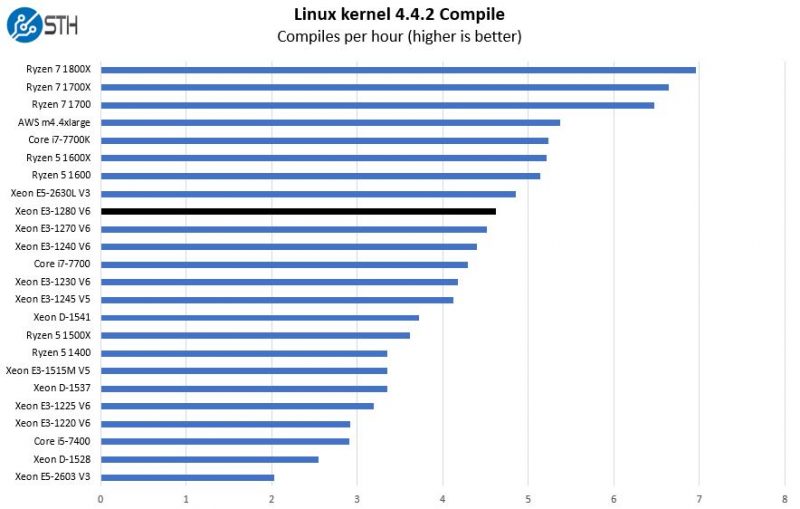
Due to the high clock speed, when we look at software compilation the Intel Xeon E3-1280 V6 is actually competitive with the Intel Xeon E5-2630L V3, despite having half the cores. That says a lot about the IPC improvements plus high clock speed.
c-ray 1.1 Performance
We have been using c-ray for our performance testing for years now. It is a ray tracing benchmark that is extremely popular to show differences in processors under multi-threaded workloads.
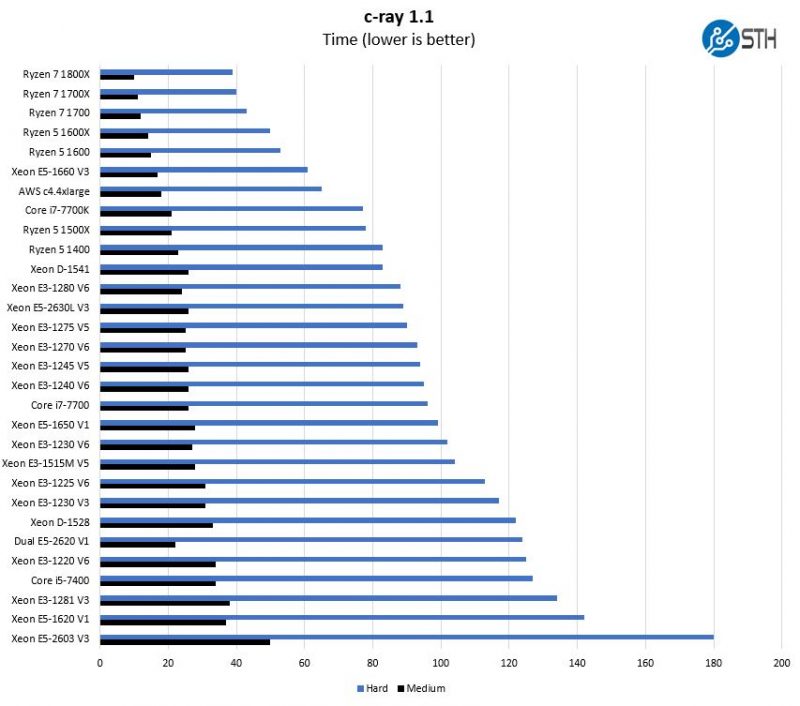
For almost double the price, it is hard to see the value of the Xeon E3-1280 V6 over the Intel Xeon E3-1270 V6. We are seeing incremental improvements, but not by much.
7-zip Compression Performance
7-zip is a widely used compression/ decompression program that works cross platform. We started using the program during our early days with Windows testing. It is now part of Linux-Bench.
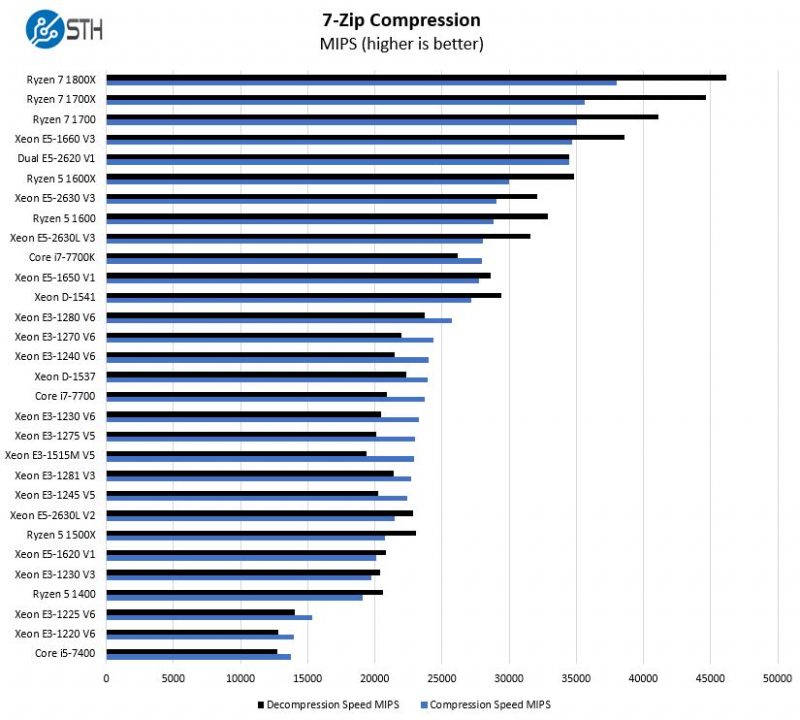
In terms of raw compression speed, we see significant performance benefits with the Intel Xeon E3-1280 V6 balancing high clock speeds and high IPC.
NAMD Performance
NAMD is a molecular modeling benchmark developed by the Theoretical and Computational Biophysics Group in the Beckman Institute for Advanced Science and Technology at the University of Illinois at Urbana-Champaign. More information on the benchmark can be found here. We may replace this or augment with GROMACS in the next-generation Linux-Bench as that test is currently running through regressions.
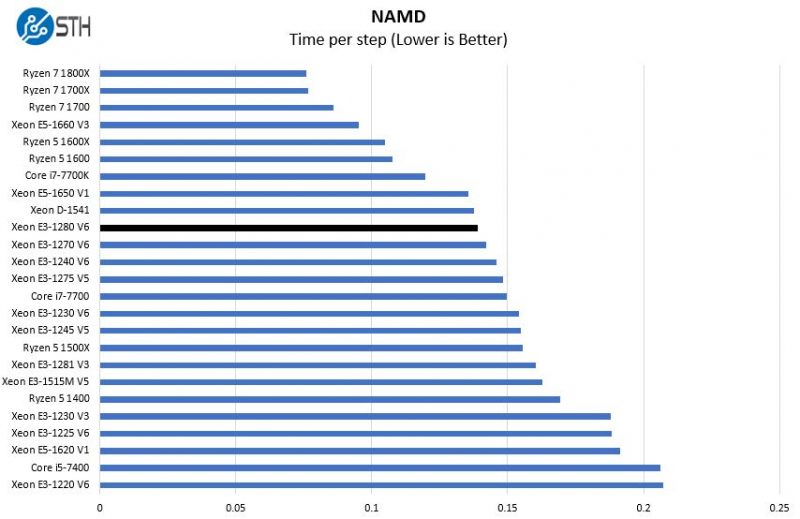
NAMD Is a benchmark well suited to AMD Zen architecture. We can see that the high clock speeds do put it in the realm of the similarly priced D-1541 platform.
Sysbench CPU test
Sysbench is another one of those widely used Linux benchmarks. We specifically are using the CPU test, not the OLTP test that we use for some storage testing.
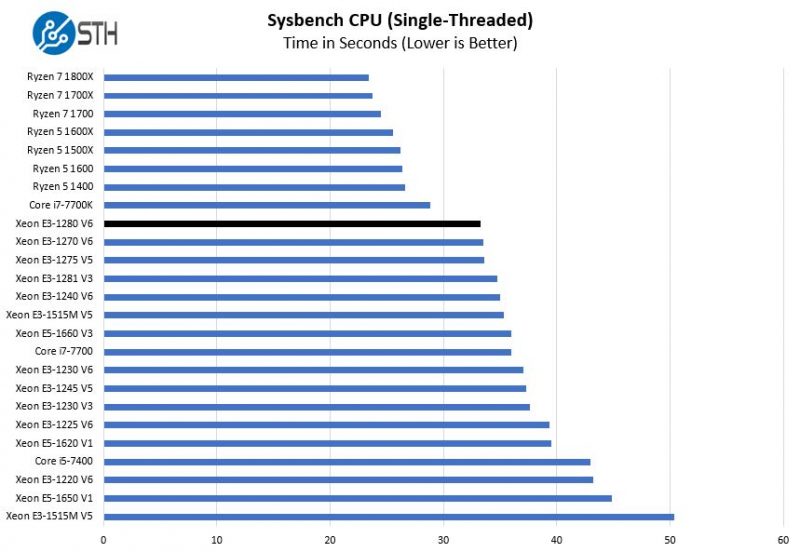
Single threaded performance, as we would expect, is nearly identical between the E3-1280 V6 and E3-1270 V6.
OpenSSL Performance
OpenSSL is widely used to secure communications between servers. This is an important protocol in many server stacks. We first look at our sign tests:
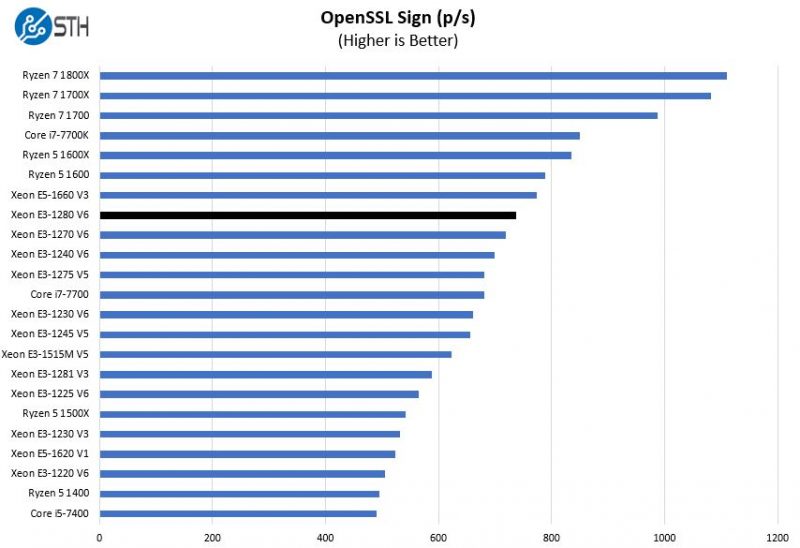
And our verify tests:
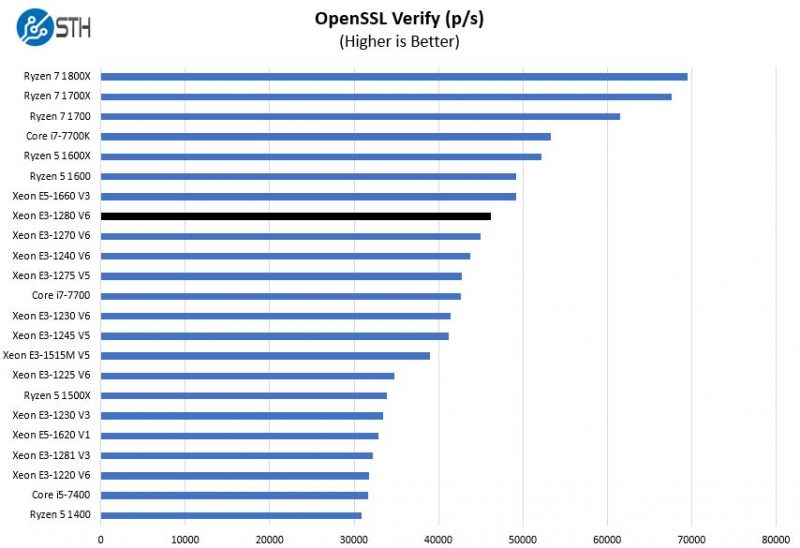
OpenSSL testing shows that the Intel Xeon E3-1280 V6 is the king of its line.
UnixBench Dhrystone 2 and Whetstone Benchmarks
One of our longest running tests is the venerable UnixBench 5.1.3 Dhrystone 2 and Whetstone results. They are certainly aging, however, we constantly get requests for them, and many angry notes when we leave them out. UnixBench is widely used so it is a good comparison point.
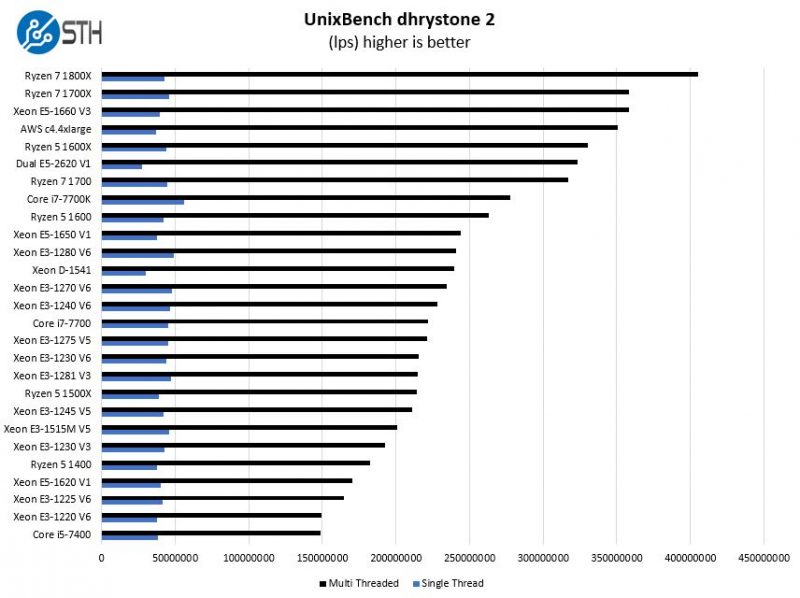
Given this result is framed largely by the comparison group we picked, but the Intel Xeon E3-1280 V6 is at the top half of the spectrum.
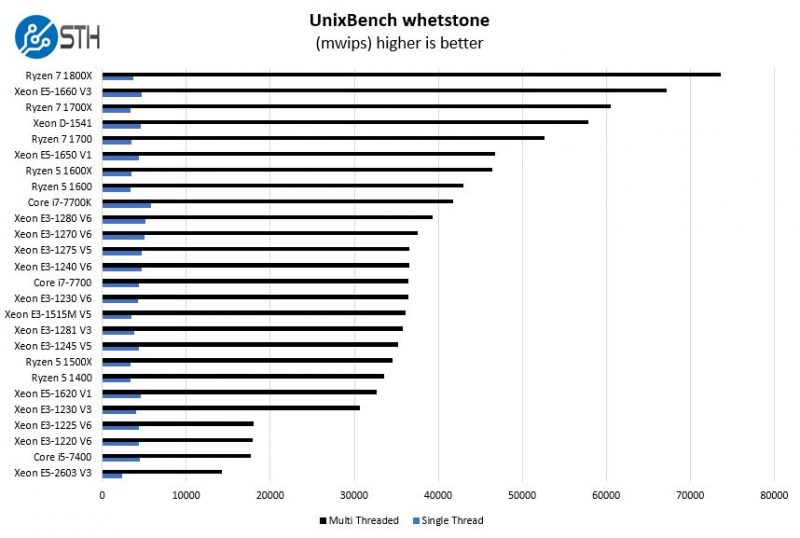
Here we can see floating point performance somewhere between an AMD 4 core and 6 core offering, despite the Intel Xeon E3-1280 V6 only having four cores. Intel’s architecture is clearly ahead.
Final Words
If you are running a Linux/ PHP/ NGINX/ MySQL stack on a basic configuration, it is very hard to recommend the top end SKU. In that case, get the Intel Xeon E3-1270 V6 instead. In fact, one could argue the Intel Xeon E3-1230 V6 or Intel Xeon E3-1240 V6 are the top value parts in the line. That view is limited in scope. For environments with high license costs, the Intel Xeon E3-1280 V6 makes perfect sense if one does not want to move into the Intel Xeon E5 range.

